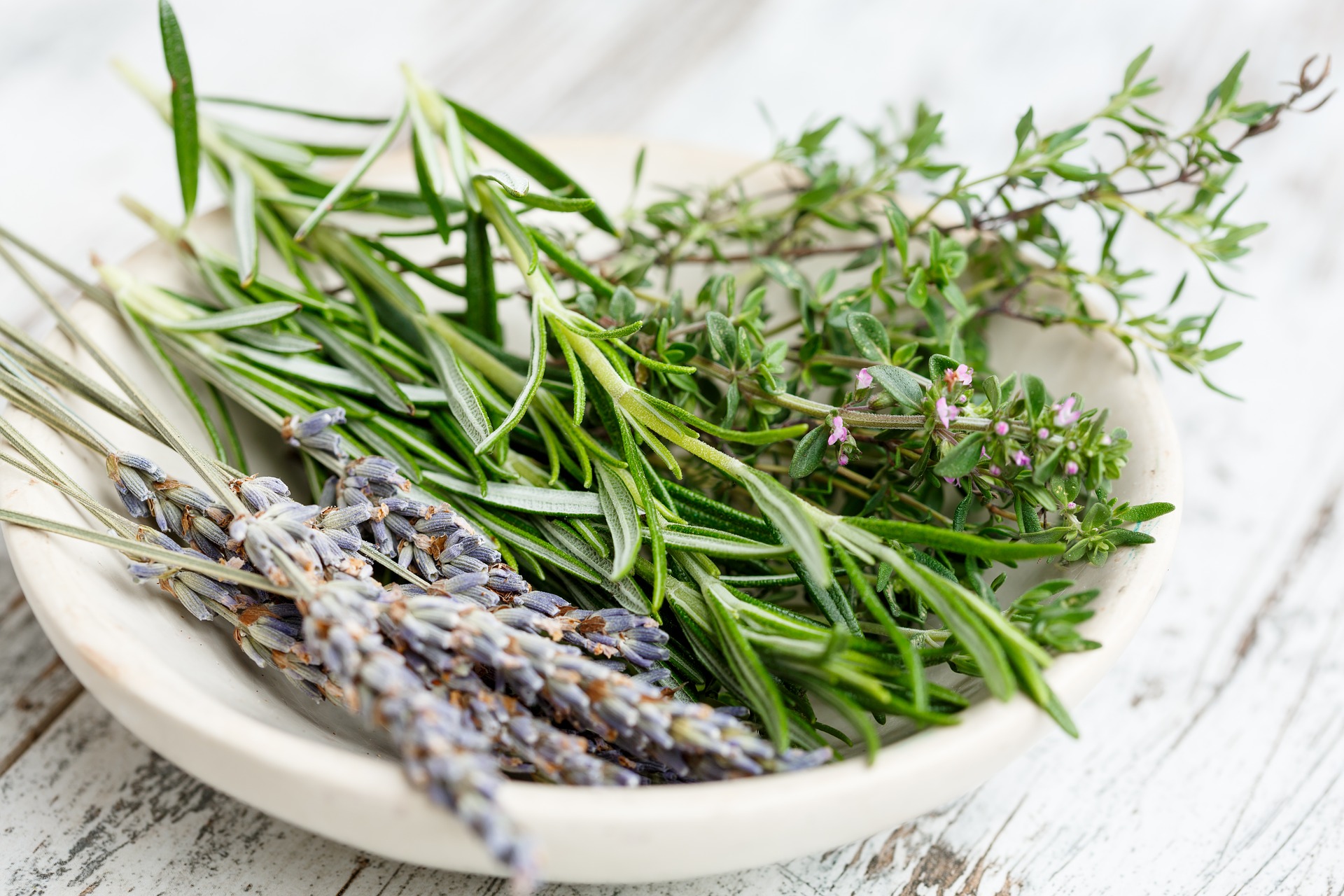Rosemary oil has a variety of health benefits that are backed by scientific studies. For example, rosemary can help improve memory as well as add shine and strength to hair. When you think of rosemary, however, you may think of freshly baked bread. Its scent certainly has a strong link to baking, but rosemary is also used in a variety of other dishes, including soups and pasta. And, especially in its essential oil form, rosemary uses go far beyond the kitchen. From hair growth to memory function, rosemary oil might be one of your best additions to your essential oils collection. Learn more about this delicious-smelling essential oil and its health uses by reading the section below.

Here are 10 uses and benefits of rosemary oil:
1. Promotes Hair Health
You may have noticed that several store-bought shampoos contain rosemary. There is a good reason for that! Rosemary oil benefits the hair in numerous ways. For example, when applied to the scalp, can help stimulate hair growth. Furthermore, many claim it can slow graying. It can also treat dandruff and dry scalp. Francesc Casadó Galcerá found that a mixture of hops, rosemary, and swertia produced the following results: (1)
- A 22.4% increase in new hair growth
- An increase in “rapid” hair growth
- An improvement in hair’s ability to resist traction
- A reduction of hair loss after shampooing
After showering, put 5 drops of rosemary oil on scalp and massage. Alternatively, you can add 5 drops to a single-use size of shampoo and use while in the shower.
2. Improves Memory

Rosemary can improve cognitive function. That is, perhaps, its most well-known property. More specifically, however, it sharpens your memory.
In fact, the International Journal of Neuroscience published a study highlighting this very notion.
In the study, they evaluated the cognitive performance of 144 participants subjected to aromatherapy. They discovered that:
- “Rosemary produced a significant enhancement of performance for overall quality of memory and secondary memory factors.”
- Rosemary helped people be more alert.
- Lavender and rosemary helped produced a feeling of “contentment” in the volunteers. (2)
Furthermore, rosemary essential oil can help treat and prevent Alzheimer’s disease. Psychogeriatrics published a study, focusing on this area. In the study, they examined the effects of aromatherapy 28 elderly people with dementia. Seventeen of them had Alzheimer’s.
Subjects inhaled the vapor of rosemary and lemon in the morning. Then, they inhaled vapors of lavender and orange in the evening. After that, various functional assessments were conducted. All patients “showed significant improvement in personal orientation.” Additionally, no one experienced any negative side effects. (3)
3. Liver Detoxification
Rosemary is great at helping your body get rid of harmful toxins. It enhances your body’s bile flow, which is essential for fat metabolism and detoxification. It also reduces plasma liver enzymes. (4)
4. Gallbladder Function
Rosemary essential oil can promote proper gallbladder function, as well. Enhancing the body’s bile flow also promotes proper peristaltic activity. This boosts nutrient absorption and helps reverse ad well as prevent toxic overload.
Mix 3 drops of rosemary oil with a quarter teaspoon of coconut oil. Then, rub the concoction over your gallbladder area 2 times daily.

4. Lowers Cortisol
A study evaluated how 5 minutes of lavender and rosemary aromatherapy affected the salivary cortisol levels. Researchers tested this on 22 healthy people.
What they found was fascinating. For example, they discovered that both essential oils enhance free radical scavenging activity. Furthermore, they found that both significantly reduced cortisol levels. This is important because lowering cortisol levels can help protect the body from some chronic diseases. (5)
5. Stress Relief
Rosemary essential oil helps lower cortisol, which is the stress hormone. However, it also works great for aromatherapy, which can also help you manage stress. Promote an atmosphere of relaxation by diffusing this oil, or sniff it straight from the bottle. Alternatively, pour the oil into an essential oils necklace, and take its scent with you wherever you go. For an even more relaxing experience, use 5 to 7 drops of rosemary oil in a warm bath. Try this directly before bed to promote a restful sleep.
6. Helps Heal The Prostate
There is evidence that rosemary essential oil may help reduce a chemical known as DHT. And lowering of this chemical is associated with prostate health. (6)
In order to promote a healthy prostate, mix 2 drops of rosemary essential oil with 1/2 tsp of carrier oil and rub beneath the genital area.
7. Reduces Pain

Rosemary oil has powerful anti-inflammatory properties. Furthermore, it has strong calming affects. For these reasons, it’s great for helping relieve pain. (7) And, more specifically, it may help relieve pain and inflammation associated with arthritis. If your joints are achy or you are battling arthritis, try using rosemary oil for some much-needed relief.
Mix 2 drops of rosemary essential oil, 2 drops of peppermint oil and 1 tsp of coconut oil. Then, rub on sore muscles and painful joints.
9. Relieves Neuropathy and Neuralgia
Pain from damaged nerves can be debilitating. However, you can help relieve it with rosemary oil.
Start with 2 drops of rosemary essential oil. Add in 2 drops of helichrysum oil and 2 drops of cypress oil. Mix it together with 1/2 tsp of a carrier oil. Then, rub it on the affected area.
However, it is recommended you do not use rosemary essential oil on children. Try frankincense oil instead. Be sure to consult with your natural healthcare provider.
10. Improves Oral Health

Rosemary essential oil is great for oral health! It’s a disinfectant, so it can help remedy bad breath. Furthermore, it can prevent gingivitis, cavities, plague build-up, and other dental conditions. (8)
Try adding a drop or two to your toothpaste. Alternatively, make your own toothpaste with rosemary essential oil, baking soda, peppermint oil, and coconut oil.
Side Effects to Consider
Taking undiluted rosemary oil orally can cause numerous side effects. This includes vomiting, uterine bleeding and kidney irritation. Rosemary oil may also cause increased sensitivity to the sun, and may result in skin irritation. As always, it’s best to dilute an essential oil with a carrier oil, such as coconut or jojoba, prior to topical use. If you are pregnant or nursing, ask your doctor before using rosemary essential oil.


